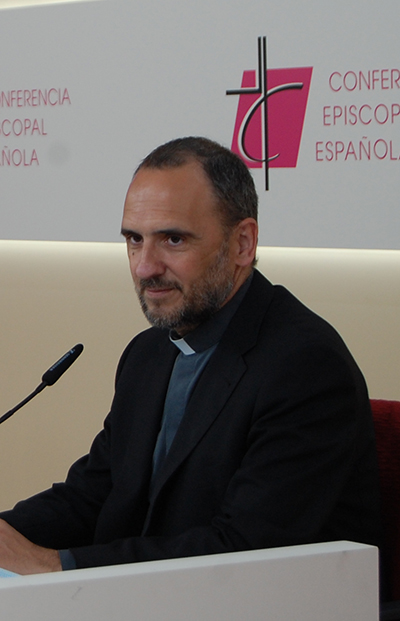Journalist and priest of the diocese of Pamplona-Tudela, José Gabriel Verahas been the Media Delegate of this diocese for more than a decade and secretary of the Episcopal Commission for Social Communications.
A journey that has given him an in-depth knowledge of the different faces of the information environment and that has helped him to capture the key points of "The Path to Reputation. How communication can improve the Church."The book defends the idea, as José Gabriel Vera points out in a conversation with Omnes, that "the task of those who work in ecclesial communication is to invite both parties to make a greater effort: to communicate more and to understand better.
Often, and still today, there are those who accuse the Church of being wary of communication. Does this distrust exist, and vice versa?

-It is not a distrust of the world of communication, although it may seem so. There are two issues that can lead one to think that. On the one hand, people work in the Church not to appear in the media but to fulfill a mission. They do not do it either for the audiences or to look good. That is why, when the media approaches these people who do so much good, they find that, in general, they do not want to appear in the media, they do not find it interesting. On the other hand, it is true that when someone from the Church sees his Church reflected in the media, he does not recognize it, he has the impression that nothing has been understood and that it is not well treated. And they end up taking the measure to appear as little as possible in the media.
Conversely, I do not think there is suspicion but rather ignorance, prejudices (in the strict sense of the word: pre-judgments). For some media, approaching the Church is like approaching nuclear paste: I will not understand anything, I will not be able to get into it, I take a couple of headlines that fit and I pass the screen.
The task of those who work in ecclesial communication is to invite both parties to make a greater effort: to communicate more and to understand better.
For some media, approaching the Church is like approaching nuclear paste: I'm not going to understand anything, I grab a couple of headlines that fit and pass the screen.
José G. Vera
How has your experience as a journalist, media delegate and secretary of CECS (Episcopal Commission for Social Communications, as it is now called) influenced this book? Could we say that it is a small "manual" for Church communicators?
-The book is aimed at those who, in the Church, are dedicated to communication and those who, in communication, are dedicated to the Church. On the one hand, you find journalists who approach the Church without much knowledge of our history, our structure, our message, our mission. And it seemed to me that telling it in the key of communication could help them to get a small picture of what the Church is, what its core is and how it expresses it. On the other hand, for the communicators who work in the Church, I wanted to present a necessary path that, from the communication point of view, must be pointed out to the Church in order to reach its reputation. A path that has some previous stages and that requires a complete review at each step.
When the Church has a bad reputation or a bad image in the society it serves, the problem is not with society - as is often thought among those who govern - the problem is with the Church itself.
Do you think that there are still those within the Church who have the idea that the role of corporate communications is simply to "cover up the embarrassments" of the institution? Do we learn from crises?
-I think that is no longer the case. At least in the field of communication, within the institution, it is clear. This conviction, which springs from the theory of communication and also from the Gospel, must be extended to each member of the institution, with delicacy and also with determination. It is necessary to explain many times that it is convenient to say things as they are, that it is convenient to tell once and a thousand times what we are and what we do, because the more we speak, the better known we will be and the better we will be able to fulfill our mission.
In this time of transparency, and even more so in the world of social networks, the gospel phrase "what you say in secret will be preached on the terraces" is fully valid. It is not necessary to cover the wounds but to air and disinfect them, even if there are people who want to poke into the wound to make it more painful and harmful.
When the Church has a bad reputation or a bad image in the society it serves, the problem is not with society but with the Church itself.
José G. Vera
Do today's society and the Church speak the same language? In the case of the Church, can it happen that we take for granted or understand things that are not understood at all?
-No, we do not speak the same language, but we have to adapt our language to be better understood. This is a permanent effort of any institution, to be understood by those who do not speak the same language, by those who have a different mental or formal structure, or simply by those who do not know us. Basically, it is also the effort of a father of a family to make his children understand his concerns, his decisions and his projects. To make oneself understood is an indispensable work of communication for the Church.
Moreover, this context of profound change in languages, values and ideologies requires a constant review of our communication to see if what is understood coincides with what we want to communicate.
He believes that we Catholics are perhaps too "modest" to be "modest". influencers of faith naturally within, for example, a life dedicated to fashion, engineering, law...?
-I think that there is, on the one hand, a weakened Christian life, reduced to a moment of the week (or of the month or of the year), making it difficult to express publicly a spiritual life that has little relevance for the person himself. On the other hand, in those persons with a greater awareness of the Christian life, there is a lack of mission consciousness, of being sent.

This is understandable because many of those who live the faith came to it not through an effort that transformed their lives, but through a family, school and ecclesial environment that enveloped everything, an environment in which they were born and in which they were formed. But that environment no longer exists. It is important to realize that the next generation will be Christian if there is a personal commitment on the part of each Christian to ensure that the future is Christian, and the indispensable path is witness. A testimony that in these times is more and more costly, has more consequences in life and can become risky.
In short, it is a matter of increasing the awareness of belonging among Christians and the awareness of mission: I am part of this people and I am sent on a mission.











